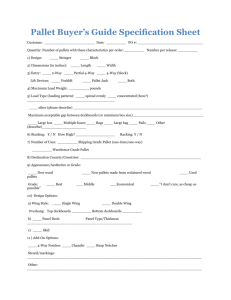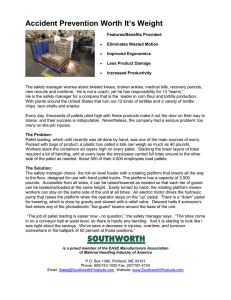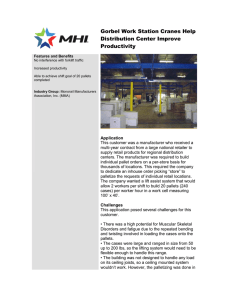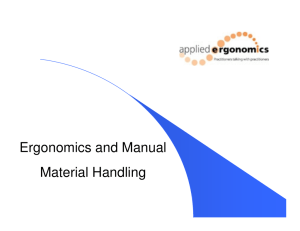RollerForks ® The new revolution for palletless transport
advertisement
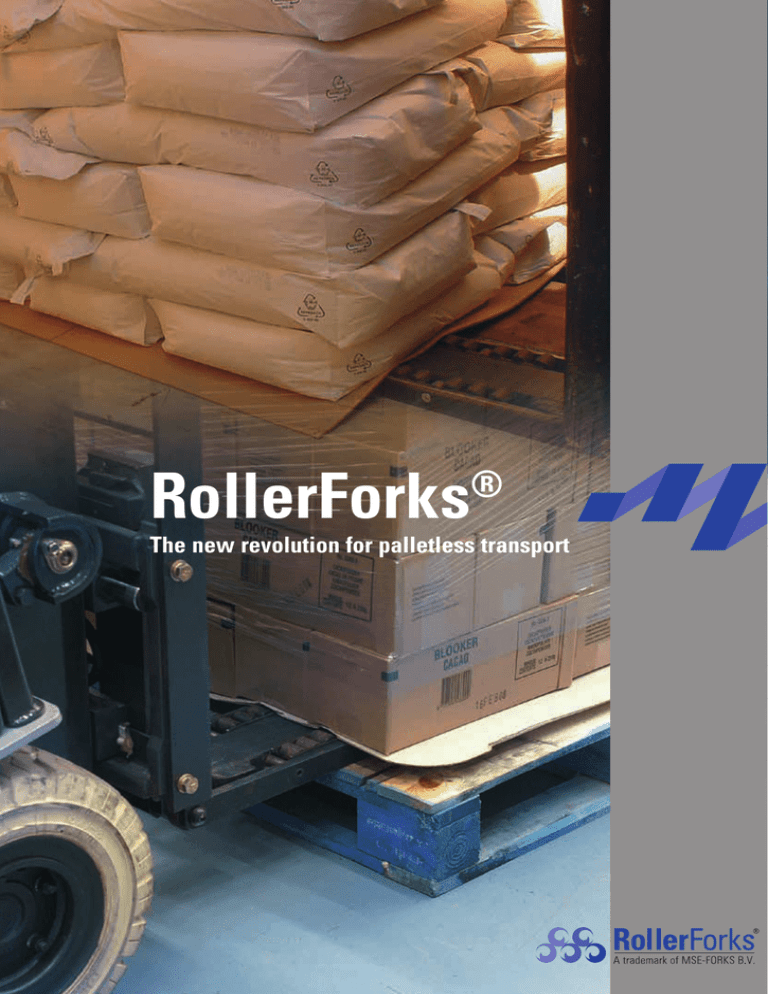
RollerForks ® The new revolution for palletless transport RollerForks® MSE-FORKS knows the use of pallets for the storage of goods is unavoidable in a company. But what if you want to save time and space by sending your goods to the customer without using pallets? MSE-FORKS introduces the RollerForks® which can be used for palletless handling. RollerForks® are in fact ‘standard’ lift truck forks with two layers of rollers. When the under most row of rollers touches the floor, it causes the uppermost rollers to rotate in the opposite direction whereby the forks slide under the slipsheet without disturbing the products. When the forks are lifted up, the rollers ‘fall’ downwards and place the products securely on the upper side of the forks, enabling the products to be unloaded in the opposite loading order. The RollerForks® have unique characterisations with regard to the familiar push-pull system. The characterisations are: • • • • • • • • Investment costs are much lower. T he driver’s visibility is not obstructed. Products can easily be placed on a pallet. No extra heavy capacity lift truck is needed. No hydraulics needed on the RollerForks® or lift truck. The lift truck can also be used to perform standard lift truck tasks. The actual weight of the RollerForks® is almost the same as standard lift truck forks. The loading and unloading time is faster than that of, for example, a push-pull system. Advantages of slipsheets When your company is faced with transporting of goods everyday, it is important for you to know that there is a way to save money on transport. You can choose slipsheets instead of pallets for the transportation of goods. The advantages of slipsheets over pallets are: • lower purchasing costs • increased volume and weight capacity available in trailers and containers • 98% less empty stacking space needed • less handling, less administration and less return transport • better hygiene and easier to clean. • more ecologically sound • no return materials Alternative for the push-pull Though the application of slipsheets has been a success in many applications, the hydraulic attachment required, the push-pull, is expensive and heavy. As a result, some of the potential advantages are undone. Compared to a push-pull system the RollerForks® offer the following unparalleled advantages: • reduced investment costs • RollerForks® weigh little more than ordinary forks allowing a smaller lift truck to be used • no hydraulic connection needed • applicable to light weight electric stackers • no loss of visibility • almost no maintenance needed because there are no hydraulics and no lubrication points • RollerForks® can also be used for lifting standard pallets A lift truck equipped with RollerForks® is smaller and lighter but has the same lifting capacity. Companies investing in palletless handling for the first time will also find that the benefits extend to the receivers of their slip-sheeted products. The much lower start-up costs associated with the RollerForks® will lead to the acceptance and implementation of similar handling systems by the receivers of the goods. The basic principle A RollerFork® consists of a special lift truck fork that serves as a supporting frame with a special hinge in the heel allowing it to always lay flat on the floor. Inside the fork are two layers of rollers, one on top of the other, that drive each other when the forks are moved over the floor. The basic principle is that the upper rollers rotate at exactly the same speed but in the opposite direction of the lower rollers, which are in contact with the ground. When the RollerForks® are lifted up from the ground the rollers automatically lower and the load is held on the forks. The RollerForks® and the rollers are made of high-grade materials, and because there are no axial forces there is hardly any wear and tear. Any dirt and dust will end up on the floor. Varied range of application RollerForks® can be fitted to the most forklift trucks with a FEM fork carrier including lightweight electric stackers. Products in boxes and cartons, bagged goods, FIBC’s etc can be transported with RollerForks® when placed on a slipsheet. Since there are no hydraulics and lubrications required, the RollerForks® are particularly well suited to the food, the chemical, the consumer goods, the beverages and pharmaceutical industries. It is also possible to place a load with slipsheet on a standard pallet for in house transport and storage. 1 RollerForks® easily fit every lift truck. 3 Lifting up goods directly from the floor 2 If used as a pair, normal pallets can also be transported. 4 During transportation the load is fixed on the forks. Introduction of the RollerForks® Before a trial or introduction of the RollerForks® can take place, it is important to look in detail at the application and objectives. This will involve a basic study of the logistic process, size and types of packing (maximum weight 4400 lbs), choice of slipsheets etc. If the analysis leads to a trial it is important to have good on-site technical support. When tested, the RollerForks® can be fitted on a standard FEM fork carrier of an existing lift truck. No additional hydraulic functions are required. RollerForks® RF-Pallets What if your products are stored on pallets before they are being transported? MSEFORKS designed a special simple pallet for internal use only, the so-called RF-Pallet. The RF-Pallet is a standard pallet provided with extra slats on top of the upper deck. These extra slats create a ‘roller pocket’, which makes fast entry of the RollerForks® possible. Unlike the push-pull, the RollerForks® can smoothly lift the slipsheet as the two layers of rollers simply push the slipsheet upward, no force is being used. This allows the use of thinner slipsheets or even corrugated carton sheets. In case you would work with the push-pull, you would need to use a thicker and more expensive solid board slipsheet because the push-pull literally needs to pull the slipsheet of the pallet. The operating time while using the combination of RollerForks® with RF-Pallet will speed up enormously. It is much faster than the push-pull, because the push-pull needs to make more moves to lift the load. First the face plate needs to be moved forward, then the ‘gripper’ needs to clamp the sheet tap and then finally the entire load can be retracted onto the wide fork plates. If you use RollerForks® it simply requires one movement to lift the goods. Two-way Four-way Two-way Multi The two-way RollerForks®-Pallet allows The four-way RollerForks®-Pallet allows you The two-way multi RollerForks®-Pallet you to load slipsheeted goods into the to load slipsheeted goods into the container allows you to use multiple sets of container in one single direction. in a pin wheeled manner as pallet-less RollerForks® and load the slipsheeted RF-Pallet RF-Pallet RF-Pallet loads can be removed from either the long goods into the container in one single side or short side of the pallet. direction. Examples of using the RollerForks® Pallet RF-Pallets transferring goods In the food industry, the use of plastic pallets is obligated through hygiene regulations (HACCP). But the investment costs of plastic pallets are high and therefore the total number of the pallets needs to be limited. The plastic RF-Pallet, on the other hand, is only used inside the production area and can save you a lot of money. The pallet has an extra set of synthetic slats on the upper deck and the RollerForks® perfectly fit between them. By first laying a slip-sheet on the pallet, the forks later roll effortlessly under the slipsheet. After the goods are on the RollerForks® they simply roll of the forks on a standard wooden pallet inside the warehouse where the wooden pallet can be stored. RF-Pallets in combination with bagged goods Many different kinds of products are being packed in synthetic or paper bags, weighing 55 lbs. To increase the loading speed of containers a wooden RF-Pallet can be used. Now, a lift truck driver can complete a 40 feet container in 15 minutes. This normally took at least 50 minutes by two persons doing it manually. The RF-Pallet increases handling speed enormously and allows the use of cheaper cardboard slipsheets to save even more money. After the goods are placed on the RF-Pallet, they can be stored inside the warehouse just like standard pallets. As soon as the containers arrive the in house RF-Pallets are being taken out from the racking system. RF-Pallets: loading goods without slipsheets To avoid waist and extra costs of slip-sheets, a third RollerFork® can be used to support the goods sufficiently without using slipsheets. A pallet takes up a lot of extra space and costs. A slipsheet uses less space and is much cheaper. Manual handling is also possible but this will increase labour costs. The replacement of a standard pallet by a pallet with extra supporting laths makes is possible to place boxes directly on the forks. A third RollerFork® in the middle supports the inner layer of boxes. For standard pallet handling the middle RollerFork® can be folded upwards. Saving example Because the RF-Pallet is an in house pallet, the return on investment time is very fast. To make a pallet RollerFork®-suitable, for example six wooden slats of $ 1,00 are needed. After this adjustment a corrugated board sheet of euro 0,30ct instead of an original solid board slipsheet of $ 1,30 can be used. For each pallet that is sent, you can save $ 1,00 on slipsheets. This means that after six pallets the investment costs of the slats are being earned. RF-Pallet Specifications Depending on the application and the budget you have, you can adjust a pallet yourself or order one at your pallet producer. The size of the opening between the extra slats depends on the slipsheet you are going to use, the load you want to lift and the capacity of the RollerFork® you use. A profile height of 1.6” or 1.9” and an opening that is wider than the width of the RollerForks® is sufficient to push the RollerForks® under the slipsheet or directly under the goods. Thanks to the unique system of the RollerForks® goods can be lifted without any friction, this makes it almost impossible to damage the goods while using a slipsheet. The extra slats can be fixed in the length direction as well as in the cross direction and on a closed upper deck as well as on an open upper deck. Specifications RollerForks® RollerForks® for standard applications Type Cap lbs/pair L W C CoG Mass ISO/FEM LC 20”(in)(in) (in)(in) (lbs) RFC 10-1100 2,200 43.3 7.4 1.9 13.5 286 2A RFC 10-1200 2,200 47.2 7.4 1.9 15.5 297 2A RFC 15-1100 3,300 43.3 6.2 1.9 14.8 253 2A RFC 15-1200 3,300 47.2 6.2 1.9 12.7 270 2A RFC 20-1100 4,400 43.3 8.2 2.3 13.2 323 2A RFC 20-1200 4,400 47.2 8.2 2.3 15.2 341 2A RFC 24-1100 5,280 43.3 8.2 2.3 13.0 332 2A RFC 24-1200 5,280 47.2 8.2 2.3 15.0 352 2A RFC 30-1100 6,600 43.3 12.2 2.3 12.5 561 3A RFC 30-1200 6,600 47.2 12.2 2.3 14.6 594 3A W C CoG Mass ISO/FEM RollerForks® for refrigerated containers Type Cap lbs/pair L LC 20”(in)(in) (in)(in) (lbs) RFCC 10-1100 2,200 43.3 RFCC 10-1200 2,200 RFCC 20-1100 4,400 RFCC 20-1200 RFCC 24-1100 RFCC 24-1200 • • • • • 9.8 1.9 14.9 286 2A 47.2 9.8 1.9 16.5 303 2A 43.3 10.6 2.3 13.7 352 2A 4,400 47.2 10.6 2.3 15.1 376 2A 5,280 43.3 10.6 2.3 13.7 360 2A 5,280 47.2 10.6 2.3 15.3 387 2A Other lengths and capacities on request. RollerForks® meets all available standards. The capacities shown apply the forks and not the lift truck. The lift truck manufacturer must determine the combined RollerForks® and truck capacity. MSE-FORKS B.V. reserves the right to modify and improve their products without prior notice being given. ISO 9001-2008 Quality management for development and production. ISO 2328 Dimensions and tolerance of suspension. Innovative Logistic Products MSE-FORKS, Inc. 131 Franklin Plaza, Suite 335, Franklin, NC 28734 Tel: (828) 349-9619, Fax: (877) 548-4604 info@mse-forks-inc.com www.mse-forks-inc.com MSE-FORKS B.V. Oudebildtdijk 894, 9079 NG Sint Jacobiparochie Tel: +31 (0) 518 49 29 29, Fax: +31 (0) 518 49 29 15 info@mse-forks.com www.mse-forks.com CE European guideline for machines (2006/42/EC), forks have a safety factor of three times rated capacity.
